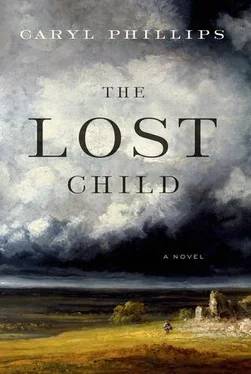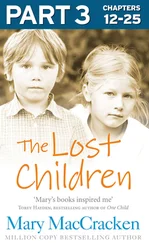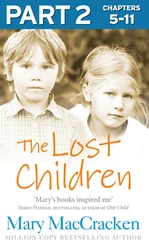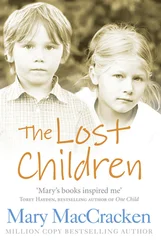It was the week before Christmas, and they were squeezed together in the back of a post-chaise that haltingly picked its way across the solemn moors in the direction of Haworth. This was the season when the desolate light of day simply expired and was quickly swallowed up by a sudden tide of blackness. It had been a tiresome journey, and her troubled sister had travelled with a sorrowful, closed heart that she knew would refuse any sentiments of sympathy. To offer solace would be to irritate, and so she had resigned herself to watching the dispiriting drama of Charlotte’s further relinquishing governance over her emotions. Driving rain began to lash down and beat an impatient cadence on the roof of the flimsy box, but mercifully it was now possible to see the beacon light of a solitary candle sputtering in an upstairs window of a far-off inn, and the horses begin to trip with renewed verve. Charlotte, however, remained consumed by her deep melancholy. Her sister’s petals had closed in upon themselves. She was returning to Papa as less than that which she had been.
The girls were back home, and on their first afternoon Papa extended an invitation for them to take tea with him. The house was empty, for according to Papa, Anne’s teaching duties would delay her return until Christmas Eve. She assumed that Branwell was out frolicking with his friends, but they would not speak of the brother and the son, for the strain of doing so would cause Papa pain and embarrassment in equal measure. The son had become an object of scorn in the village; he was no longer a carefree young man with an untidy mop of red hair and a convivial face that radiated optimistic goodwill to all. Papa’s son was a drunk who appeared intent on punishing himself for having squandered his talents and abandoned any ambition, and Anne’s letters had been charged with an anxiety that Branwell might soon be found residing beneath the church flagstones. Apparently, when their brother was not swilling gin or begging threepenny packets of opium pills, he had taken to charging about the countryside in a filthy cart pulled by a wild horse in a manner that implied he knew of no other world beside that of the farm.
But they would not speak of the son. The maid had spent the afternoon baking, and she generously laid out the cakes and poured the tea. Emily could hear an excited Keeper barking and agitating for her company, for according to Papa, he had truly languished during her absence. However, the dog need worry no more, for she had no intention of returning to Brussels after this Christmas break, and Keeper would once again have her by his side. She glanced at her sister, who had no experience with the art of dissembling, and whose brown eyes brimmed constantly with tears. Regretfully, she accepted that the blame for this pitiful display could not be entirely borne by Monsieur Heger, for she had come to believe that, prior to their departure, her sister’s condition was such that her poor heart was ready to be cleaved by any man wielding interest. A bewildered Papa smiled at his daughters, and took his tea in silence.
Her bed felt strangely uneven, and the room was cold, but after the frustrations of the Continent she was relieved to have returned to the Parsonage. The rigours of travel had incited her hair to curl uncooperatively into an unruly, tangled ball, and the whole knotted mess nested uncomfortably on her head as though unfamiliar with the scrutiny of a comb. A sideways glance in any looking glass simply confirmed her irregular features; the sharply angled nose and the unappealing protrusion of her mouth were distinctions she had learned to live with, but she would always quickly avert her eyes. Through the slither of window, she stared at the brooding black sky and promised herself that never again would she range beyond this world. Her confidence had been much improved by exposure to the mediocre abilities of the dull girls at Monsieur Heger’s school, but now she was home and able to issue out for a walk on the moors whenever she wished. Her poor sister would shortly discover that she must make her return journey alone, and risk having her heart truly shattered by the triumph of her own foolish urgings over the reality of her mentor’s situation. Emily drew a strand of corkscrewed hair away from her eyes and continued to stare into the darkness, knowing that she would not sleep until she heard dear Branwell staggering up Church Lane. However, while she waited, she once again climbed the short, steep staircase of her imagination, and again she found herself dreaming of the boy who came from the moors, and she listened to the sound of pebble-dashed soil drumming hard against the lid of a plain coffin, and she turned over and curled up in her mind and began to search for her boy.
* * *
And now she hears her sister quietly rise to her feet and begin to sidle her way out of the room. Poor Charlotte. Her second year in Brussels poisoned her fortitude, and she returned home with eyes that flashed in all directions without ever alighting upon a single object, and an agitated disposition that refused to be drawn into any conversation on the wretched subject of her professor. She wrote increasingly imploring letters, but the master’s wife eventually answered, and then there were no more letters and Charlotte finally released this man whom she had foolishly captured in her thoughts. Indeed, her sister did allow herself to grow plump, but time eventually took her in hand and by degrees soothed the pain of her loss. However, while Charlotte gradually recovered her equilibrium, Emily continued to wander in her mind out onto the moors, where she pulled the landscape gloriously tight around her like a worn green blanket and hid herself away. When she returned to this world, she took charge of the maintenance of the Parsonage, while her eldest sister looked on in puzzled amusement that Emily might find contentment in cooking and cleaning. Once she had finished performing the household obligations of a servant, however, she would again balance her portable desk upon her knees and exchange the sterile pleasure of this life for the soaring joy of her heather-clad world.
She hears Charlotte cautiously close in the door behind her and then begin to walk softly back in the direction of the kitchen, where she will report to Anne on their sister’s unchanged situation. Oh, Anne, poor Emily remains unreachable, and to question her is to risk introducing great uneasiness in her pale, thin body. Anne will nod uneasily as Charlotte continues. At regular intervals her obstinate cough becomes trapped in her throat and causes her breath to rattle, but our dear invalid claims the situation is entirely tolerable and wishes to be a burden to none. Knowing that they have little choice but to pray and wait, Anne will put down her sewing and begin to replenish the smouldering embers.
Charlotte will not report to Papa, who has shown no desire to present himself at the bedside of his ailing daughter. Half the family gone, but still, he refuses to bestir himself and offer his fading Emily the comfort of his company. His stern demeanour and distant sentiments appear to be entirely unaffected by the predicament of his poor child. They used to be close, especially after Charlotte’s return to Belgium in search of love, for this departure left father and daughter alone in the Parsonage. Each morning he would set a mark at the end of the garden in the direction of the church spire, and then give his lanky girl instruction in how to shoot a pistol. Keeper cowered in fear, and Emily brandished the weapon with a presumption that almost made her father forget the accident of one son. Standing tall, his whiskers brushed back scrupulously against his cheeks, his eyes bright and glassy behind his thin wire spectacles, Papa would warily move her elbow into the correct position, and she would concentrate hard and then scatter the crows. Of course, she always hit the mark. How well you have done, my dear Emily. She would smile, and then momentarily retreat to the kitchen and continue baking bread or ironing clothes, and simply wait until Papa had reset the mark, and reloaded, and was once again ready for her to resume practise. As she bounded from the kitchen in her unalluring clothes, she would cry out, Papa, are you prepared? Are you? It is now wrong of him to hide away and edge furtively into her room at the dead of night when he imagines that she is asleep. Or has she been dreaming this? Tonight she will lie awake with her head snug in the clammy nest of the pillow and wait for the whispering of Papa’s stocking feet. She used to listen for the sound of Branwell’s drunken braying, which heralded the pageant of his disorderly arrival, but now she waits for stealthy Papa with her eyes open, and she dreams of a swift recuperation to accustomed vigour, and she hopes that Papa might revive her like a sudden burst of moorland air.
Читать дальше












